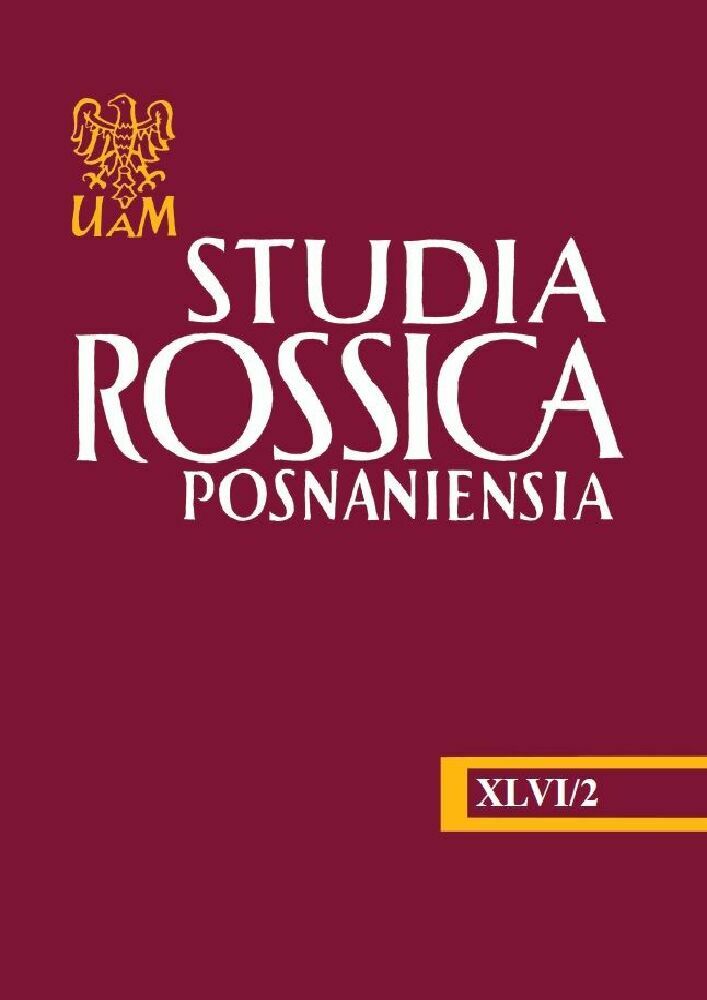Abstrakt
The aim of the article is to analyze the language of the Soviet propaganda posters from the Second World War period, containing the poetic commentary of the members of the Moscow TASS Agency. The research reveals the main means of persuasion used in the poems. The subject of the analysis is the phenomenon of spreading ideas in two basic social spheres that occurred in the Soviet Union during the war period, which include people who took direct part in military actions, and Soviet citizens who provided the army with all the necessary materials. Texts addressed to potential soldiers contained a direct call to defend the homeland and family. Their most important manipulative tools were emotional arguments and the technique of stereotyping the enemy. Ideas and personal patterns were instilled in the minds of the fighters with various linguistic manipulation techniques. The propaganda referenced to the belongingness need. Different propaganda techniques were used in poems targeted at people behind the lines of hostilities. The authors of the texts of TASS Windows used colloquial language, comprehensible to a wide audience. They created a vision of a world divided into two opposite poles and referred to respected authorities or raised new role models. The propaganda of the victory also required different techniques of information manipulation. The TASS Windows present the unique contribution of the Soviet poets to the action of the mobilization of
society to take part in the fight against the German aggressor.
Bibliografia
Bralczyk, Jerzy. O języku propagandy i polityki. Warszawa, Wydawnictwo Trio, 2007.
Docenko, Evgenij L. Psihologiâ manipulâcii: fenomeny, mehanizmy i zaŝita. Moskva, Izdatelʹstvo MGU, 1997.
Dubisz, Stanisław, red. Uniwersalny słownik języka polskiego. T. 3. Warszawa, Wydawnictwo PWN, 2009.
Kamińska-Szmaj, Irena. „Propaganda, perswazja, manipulacja: próba uporządkowania pojęć”. Manipulacja w języku. Red. Piotr Krzyżanowski, Paweł Nowak. Lublin, Wydawnictwo Uniwersytetu Marii Curie-Skłodowskiej, 2004, s. 13–27.
Konopackaâ, Tatʹâna N., Lûbovʹ È. Medne. „Ostroe pero, stihi sovetskih poètov v centralʹnyh Oknah TASS”. Sovetskie pisateli na frontah Velikoj Otečestvennoj vojny. Red. Aleksej N. Dubovikov, Nikolaj A. Trifonov. Moskva, Nauka, 1966, s. 444–451.
Kozlova, Veronika A. Psihologiâ manipulirovaniâ. Orel, MOO ABIV, 2014.
Lippmann, Walter. Public opinion. New Brunswick–London, Transaction Publishers, 1998.
Maslennikov, Viktor A. Okna TASS 1941–1945. Moskva, Kontakt-kulʹtura, 2007.
Miller, Clyde Raymond. „Techniques of Propaganda”. Propaganda analysis, 1. Red. Eduard C. Lindeman. New York, Institute for Propaganda Analysis, 1938, s. 5–8.
Vojtasik, Leslav. Psihologiâ političeskoj propagandy. Per. s pol’skogo âzyka Vladimir N. Porus. Moskva, Progress, 1981.
Vusik, Anna L. „Rečevaâ manipulâciâ – vid âzykovogo vozdejstviâ v političeskom diskurse”. Âzyk i pravo: aktualʹnye problemy vzaimodejstviâ. Vyp. 5. Red. Vadim Û. Melikân. Rostov-na-Donu, Donskoe knižnoe izdatelʹstvo, 2015, s. 92–99.
Licencja
PRACE PUBLIKOWANE W CZASOPIŚMIE DOSTĘPNE SĄ NA LICENCJI CREATIVE COMMONS:
Uznanie autorstwa-Użycie niekomercyjne-Na tych samych warunkach 4.0 Międzynarodowe.
Autorzy tekstów przyjętych do publikacji w czasopiśmie „Studia Rossica Posnaniensia” są zobowiązani do wypełnienia, podpisania i odesłania na adres redakcji umowy o udzielenie nieodpłatnej licencji do utworów, z zobowiązaniem do udzielania sublicencji Creative Commons.
Zgodnie z umową, autorzy tekstów opublikowanych w czasopiśmie “Studia Rossica Posnaniensia” udzielają Uniwersytetowi im. Adama Mickiewicza w Poznaniu niewyłącznej i nieodpłatnej licencji oraz zezwalają na użycie sublicencji Attribution-NonCommercial-ShareAlike 4.0 International (CC BY-NC-SA 4.0).
Autorzy zachowują prawa do dalszego, swobodnego rozporządzania utworem.
Autorzy, którzy wykorzystują w swoim tekście cudze utwory (np. ilustracje, fotografie) proszeni są o dostarczenie do redakcji czasopisma zgody na publikację.
Użytkownicy internetu uprawnieni są do korzystania z utworów opublikowanych po 2015 roku “Studia Rossica Posnaniensia” tylko w celach niekomercyjnych, pod następującymi warunkami:
https://creativecommons.org/licenses/by-nc-sa/4.0/
Uniwersytet im. Adama Mickiewicza w Poznaniu zachowuje prawo do czasopisma jako całości (układ, forma graficzna, tytuł, projekt okładki, logo itp.).

